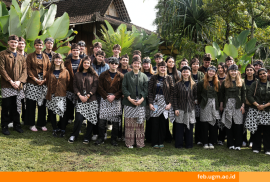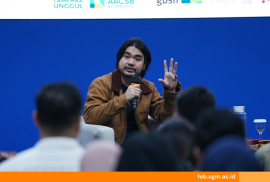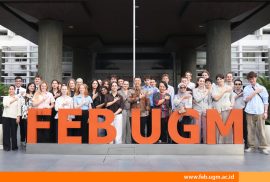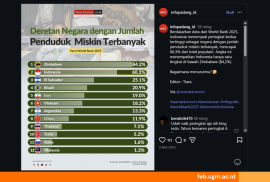Saturday (10/14), the Career and Student Development Unit (CSDU), the Faculty of Economics and Business, Universitas Gadjah Mada (FEB UGM) organized an event titled “Introduction to Founders Mindset and How to Generate Business Ideas.” Held in the Audio Visual Room of FEB UGM, Joe William, the Academic Officer of Sevenpreneur, shared his insights on starting a business. Sevenpreneur is a business incubation institution that assists individuals in establishing their ventures.
First Session: Recognizing Internal and External Aspects in Business Preparation
The event commenced with singing the national anthem, “Indonesia Raya,” and the university anthem, “Hymne Gadjah Mada.” Gumilang Aryo Sahadewo, S.E., M.A., Ph.D., the Vice Dean for Research, Community Engagement, Collaboration, and Alumni, delivered a few words of welcome. The seminar started with an introduction to Sevenpreneur by Joe. The first session focused on self-awareness as the initial step in building a business. To initiate a business, we must recognize two aspects within ourselves: internal foundation and external foundation.
The internal foundation involves understanding our strengths and weaknesses, which can be analyzed through a SWOT analysis (Strengths, Weaknesses, Opportunities, Threats). Afterwards, a personal development plan (PDP) should be formulated to address any weaknesses. Subsequently, short-term and long-term goals can be set. Additionally, analyzing personal pleasures, passions, and purposes is essential. Businesses also need to consider three roles: the designer (product designer), the showman (marketing expert), and the enforcer (operational supervisor). Financial management, time management, risk management, and business acumen are also crucial aspects of business preparation.
The discussion continued with external aspects of business, such as financing and business partners. Financing options include personal finances (bootstrap), loans, and equity ownership. Business partners are vital for the success of ventures. According to the National Bureau of Economic Research, businesses with multiple founders have a 30% higher survival rate than those with a single founder. When choosing a partner, tangible and intangible aspects should be considered. Additionally, a mentor is essential to guide and inspire business progress towards success.
Second Session: Innovating Business Ideas
The session continued with a focus on innovating business ideas. Business ideas often stem from societal problems. For example, Henry Ford’s invention of the car solved the inefficiency of horse transportation. Another example is the Ternak Uang platform, which addressed Indonesia’s need for financial literacy. In essence, problems give opportunities for business ideas.
To identify problems, three steps can be taken: finding the market, understanding behavior, and listing the issues. For instance, in the health sector, the market could be office and home environments. Behavior could involve the increasing trend of healthy lifestyles and exercise. Problems could include the lack of knowledge about healthy lifestyles in office and home environments. These identified problems can be transformed into business ideas using the low-hanging fruit theory, market gap theory, or a combination of both.
The low-hanging fruit theory involves solving easier problems first before tackling complex ones. Market gap theory entails offering solutions not yet available in the market. For instance, the creation of Gojek by Nadiem Makarim was inspired by Uber in the United States, leading to a pioneering similar concept in Indonesia.
The expected outcomes of a business can be categorized into solution-centric and monetization-centric. Solution-centric businesses focus on their societal impact, while monetization-centric businesses concentrate on financial gains. A successful business balances both benefiting society and generating economic profits.
The fundamental process of creating a business involves three stages: build, measure, and learn. Product development should consider the Minimum Viable Product (MVP) to minimize costs. Product testing can be done through A/B Testing, releasing multiple products to determine which one the market prefers. After obtaining test results, businesses can evaluate using customer metrics, including customer satisfaction levels and Net Promoter Score (NPS), indicating how likely customers are to recommend the product.
The session concluded with participants engaging in hands-on practice. They observed issues in their surroundings, analyzed them, and proposed business ideas. This session marked the end of the event for the day.
Reportase: Rizal Farizi






